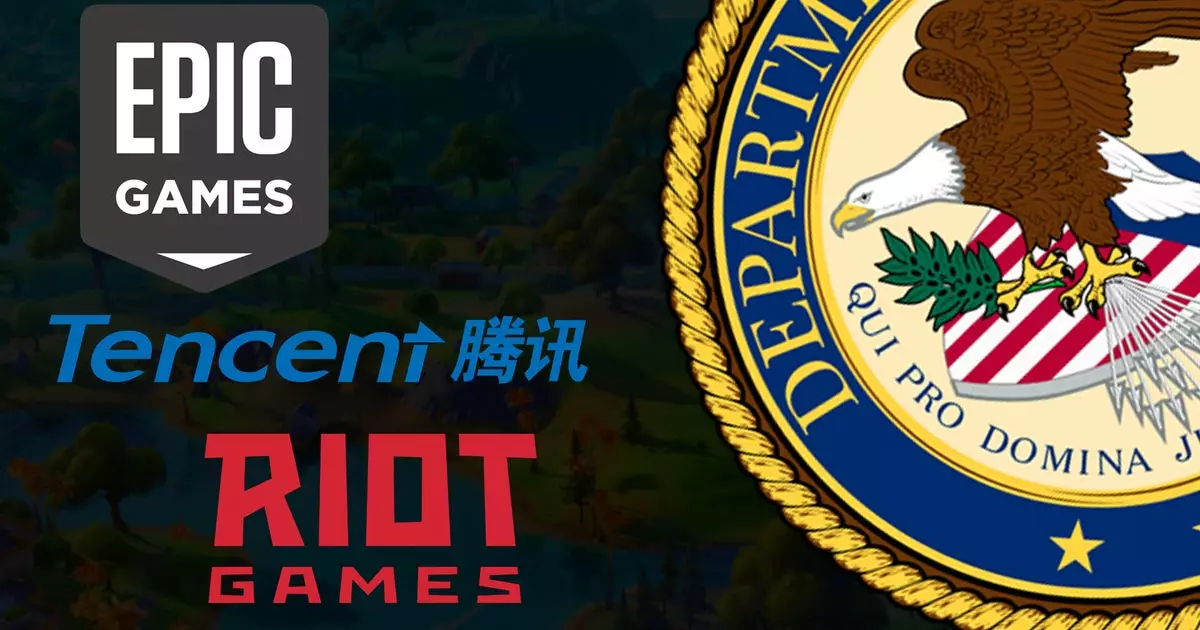The recent resignation of two board members at Epic Games highlights the tension between corporate governance and antitrust regulations in the highly competitive video game industry. With the U.S. Department of Justice (DoJ) launching an investigation into potential violations of antitrust laws, the departure of Ben Feder and David Wallerstein brings to light critical issues surrounding corporate affiliations, competition, and the regulatory landscape governing such interactions.
Antitrust laws are designed to maintain healthy competition within various markets by preventing monopolistic practices. The Clayton Act, a cornerstone of U.S. antitrust legislation, specifically prohibits individuals from serving on the boards of competing companies. This law aims to eliminate any possibility of collusion or unfair advantages that could arise when corporate interests overlap. In Epic Games’ case, the involvement of Tencent, a major stakeholder with ownership in Riot Games—a direct competitor—triggered alarm bells within the DoJ.
The investigation underscores the broader implications of corporate governance in the gaming industry. As Tencent holds significant stakes in multiple gaming entities, its influence could skew competitive dynamics. The analogy presented likening the situation to allowing a Pepsi executive to attend Coca-Cola board meetings elucidates the intrinsic conflict of interest that arises in such scenarios. The implications of this scrutiny stretch beyond Epic Games, reflecting deep-seated concerns about gaming monopolies and the broader industry landscape.
Ben Feder and David Wallerstein’s resignations seem to be a precautionary response to avert further investigations and potential penalties for both Tencent and Epic Games. By stepping down, they are acting in service of their companies, albeit amidst a swirl of controversy that could tarnish reputations and challenge stakeholder confidence. Feder, who previously served as the CEO of Take-Two Interactive, and Wallerstein, who was a senior executive at Tencent, represent a nexus of influence that the DoJ found problematic.
While neither party has admitted liability, the shake-up reflects the seriousness of the DoJ’s examination and the lengths to which companies will go to maintain compliance with antitrust laws. Additionally, Tencent’s agreement to amend its shareholder arrangement with Epic to prevent similar future oversight reiterates the importance of these regulations. This change is not just procedural; it marks a shift in how large gaming corporations may interact with one another going forward, potentially reshaping boardroom dynamics.
This incident shines a spotlight on the intricate evolution of the gaming industry and the increasing scrutiny it faces from regulators. With companies like Microsoft navigating their own antitrust hurdles when seeking to acquire Activision Blizzard, it is clear that the gaming sector is at a crossroads. The complexities surrounding mergers and acquisitions, alongside corporate governance, will only heighten as regulatory bodies ramp up their investigations.
Moreover, the definitions of competition are becoming more fluid as companies expand their portfolios and invest in various other gaming firms. The interconnectivity of these corporations can be a double-edged sword. While it promotes innovation and collaboration, it could also lead to a concentration of power that stifles competition, ultimately disadvantaging consumers. This delicate balance is essential for fostering an environment where creativity and diversity in gaming can thrive.
As antitrust investigations become commonplace in the tech-centric market, the need for transparency in corporate governance will grow even more critical. Stakeholders, regulators, and consumers alike must hold companies accountable to ensure fair competition. The resignations at Epic Games exemplify the changes required in corporate governance to maintain the integrity of the gaming market.
The departures of Feder and Wallerstein from Epic Games’ board illustrate the evolving landscape of business practices within the gaming industry and the imperative of adhering to antitrust laws. The fallout from such regulatory scrutiny demands not only a re-evaluation of existing corporate relationships but also a proactive approach in ensuring the gaming market remains competitive and fair. As the landscape continues to change, companies must navigate these complexities with care, knowing that the eyes of regulators are turning ever closer.


Leave a Reply
You must be logged in to post a comment.